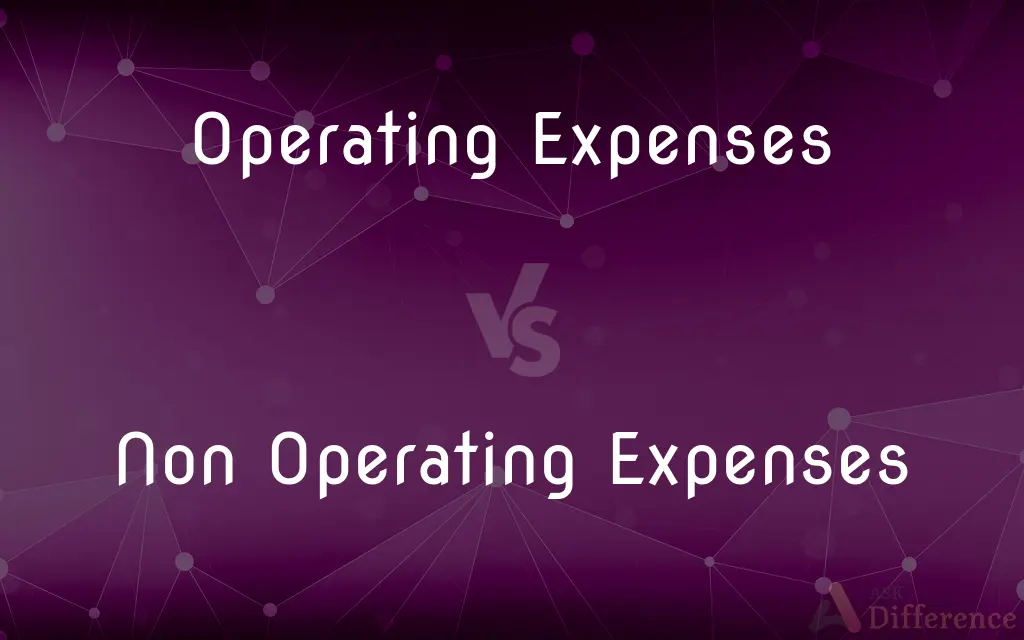Operating Expenses vs. Non Operating Expenses — What's the Difference?
By Tayyaba Rehman — Published on October 5, 2023
Operating Expenses are costs incurred in conducting normal business operations; Non Operating Expenses are costs not related to core business activities.

Difference Between Operating Expenses and Non Operating Expenses
Table of Contents
ADVERTISEMENT
Key Differences
Operating Expenses and Non Operating Expenses are critical accounting concepts, reflecting different categories of expenses incurred by a business. Operating Expenses relate to the costs incurred in the normal course of business operations. These include rent, utilities, wages, and are essential for a business to carry out its day-to-day activities. They are integral to the production and delivery of goods and services and are deducted from a company’s revenue to determine its operating income. Conversely, Non Operating Expenses are unrelated to the core business activities. They result from events that are not frequent and are not integral to the primary operations of the business, such as losses from selling assets or lawsuit settlements.
The distinction between Operating Expenses and Non Operating Expenses is pivotal for financial analysis and performance assessment. Operating Expenses are recurrent and impact the business regularly, directly influencing a company's profitability and operating efficiency. They are crucial in assessing the operational performance of a company. In contrast, Non Operating Expenses are usually infrequent and irregular, providing insights into events that are outside the normal business operations, and they often impact the company’s net income without affecting its operational income.
When assessing a company's financial health, Operating Expenses are closely scrutinized to optimize operational efficiency and enhance profitability. Controlling Operating Expenses is crucial to maintain a healthy operating margin. Non Operating Expenses, however, are often treated separately in financial analysis due to their non-recurring nature, allowing for a more accurate evaluation of the business's core operational performance.
In financial reporting, segregating Operating Expenses from Non Operating Expenses is vital for clarity and accuracy. It ensures that stakeholders, like investors and analysts, gain a true picture of the company’s operational performance and financial health. Operating Expenses reveal the costs associated with running the core business activities, while Non Operating Expenses provide insights into the financial impacts of events unrelated to primary business operations.
In conclusion, Operating Expenses represent the costs associated with conducting normal business operations and are recurrent, impacting the company’s operating income. Non Operating Expenses are irregular, unrelated to core business activities, and usually affect the company’s net income.
ADVERTISEMENT
Comparison Chart
Relation to Business
Related to core business activities
Unrelated to core business activities
Frequency
Recurrent and regular
Infrequent and irregular
Impact on Income
Affects operating income
Affects net income
Importance in Analysis
Crucial for assessing operational performance
Treated separately for accurate financial analysis
Example
Rent, wages, utilities
Loss from selling assets, lawsuit settlements
Compare with Definitions
Operating Expenses
Operating Expenses are recurrent and directly influence a company's profitability and operating efficiency.
The increase in Operating Expenses led to a decrease in the company’s operating margin.
Non Operating Expenses
Non Operating Expenses are costs not related to core business activities.
The company incurred Non Operating Expenses due to a one-time legal settlement.
Operating Expenses
Operating Expenses are integral to the production and delivery of goods and services.
High Operating Expenses impacted the overall profitability of the manufacturing unit.
Non Operating Expenses
Non Operating Expenses provide insights into financial impacts of events unrelated to primary business operations.
The inclusion of Non Operating Expenses highlighted the financial strain from non-business related events.
Operating Expenses
Operating Expenses are deducted from a company’s revenue to determine its operating income.
After deducting the Operating Expenses, the company’s operating income showed a substantial increase.
Non Operating Expenses
Non Operating Expenses result from infrequent and irregular events.
The sale of an asset resulted in Non Operating Expenses affecting the net income.
Operating Expenses
Operating Expenses are crucial for assessing the operational performance of a company.
Analysts scrutinized the Operating Expenses to evaluate the company’s operational efficiency.
Non Operating Expenses
Non Operating Expenses impact the company’s net income without affecting its operational income.
The Non Operating Expenses were isolated to assess the core operational performance accurately.
Operating Expenses
Operating Expenses are costs incurred in conducting normal business operations.
The company's Operating Expenses included rent, utilities, and employee salaries.
Non Operating Expenses
Non Operating Expenses are usually treated separately in financial analysis due to their non-recurring nature.
Analysts omitted the Non Operating Expenses to focus on the operational efficiency of the business.
Common Curiosities
How do Operating Expenses impact income?
Operating Expenses are deducted from revenue to determine the operating income, impacting the company's profitability.
What are Operating Expenses?
Operating Expenses are costs incurred in the normal course of conducting business operations like rent, wages, and utilities.
What do Non Operating Expenses represent?
Non Operating Expenses represent costs that are unrelated to the core business activities, like losses from selling assets.
Are Operating Expenses recurrent?
Yes, Operating Expenses are recurrent and occur regularly in the normal course of business operations.
How often do Non Operating Expenses occur?
Non Operating Expenses are usually infrequent and arise from irregular events not related to primary business operations.
Why are Operating Expenses important in financial analysis?
Operating Expenses are crucial in financial analysis for assessing a company's operational performance and efficiency.
Do Non Operating Expenses affect operating income?
No, Non Operating Expenses typically affect only the net income without influencing the operating income.
Share Your Discovery

Previous Comparison
Insurrection vs. Insubordination
Next Comparison
High vs. LowAuthor Spotlight
Written by
Tayyaba RehmanTayyaba Rehman is a distinguished writer, currently serving as a primary contributor to askdifference.com. As a researcher in semantics and etymology, Tayyaba's passion for the complexity of languages and their distinctions has found a perfect home on the platform. Tayyaba delves into the intricacies of language, distinguishing between commonly confused words and phrases, thereby providing clarity for readers worldwide.
















































